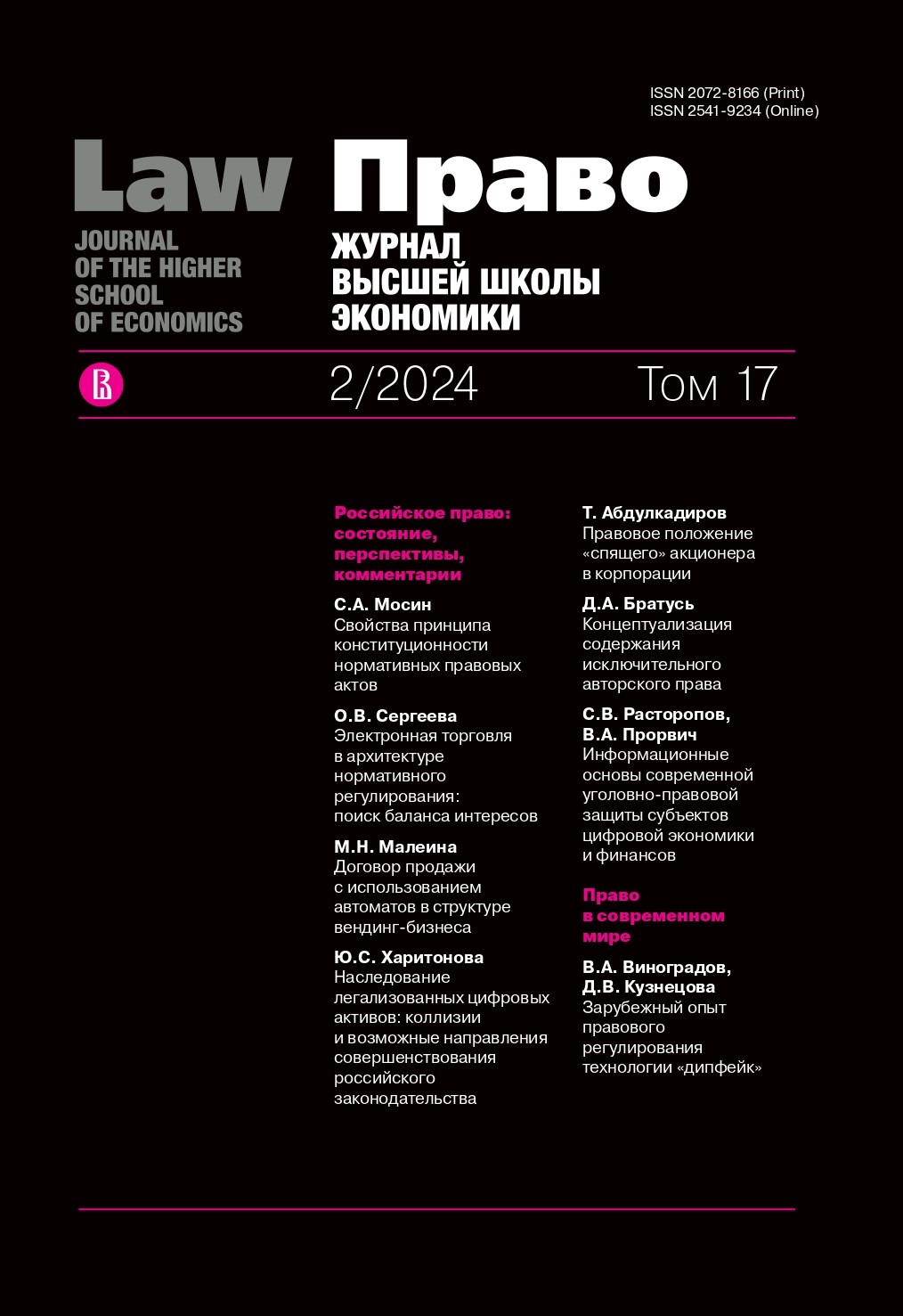Sales Agreement Using Machines in Structure of Vending Business
Abstract
The vending business is presented as a type of innovative entrepreneurial activity. This area includes several groups of relations between: the manufacturer of vending machines and the buyer of the machines; the owner of the vending machines and the operator who uses them; the operator and the legal entity for the placement of vending machines; the operator and the legal entity for purchase of goods for sale, purchase of materials to perform work, provision of services through machines, and in the role of a victim; the operator and the legal entity for the repair of machines; the operator and the consumer for the purchase and sale, exchange of goods, performance of work, provision of services, temporary use of things; operator of the fandomat as a buyer of used packaging and a citizen-seller; the owner of vending machines (manufacturer, operator) and a third party (not a party to the contract) as a violator or as a victim; between operators, as well as between each operator and a self-regulatory organization in this area. It is proposed to expand the scope of vending to include, in addition to purchase and sale, the activities of exchange, temporary use of things, provision of services, performance of work, donations. The central retail purchase and sale agreement is characterized as an agreement by virtue of which the seller (operator), without personal presence using a vending machine, undertakes to transfer ownership to the buyer of goods intended for use not related to business activities, after the buyer has completed payment actions and selection of goods, and the buyer pays for the goods. Reverse vending has its specificity in the form of a purchase and sale agreement using a machine to accept used containers for a fee, where the seller is a citizen and the buyer is an organization or individual entrepreneur. Problematic issues related to the conclusion and execution of a sales contract using vending machines are highlighted (form of the contract, type of product sold, ensuring the quality and safety of the product, amount of payment for the product, preservation of the buyer’s personal data), and ways to solve them are shown. The author justifies the enshrinement in law of a list of goods the sale of which is unacceptable through vending machines or is prohibited for sale in certain places. Research methods: general scientific methods, as well as systematic and logical analysis of scientific literature, norms of Russian legislation, comparative law method.
References
Abramov V.Yu., Abramov Yu.V. (2023) Legal regulation of new types of business activities: a guide. Moscow: Justitcinform, 320 p. (in Russ.)
Abramova E.N., Averchenko N.N., Arslanov K.M. et al. (2010) Commentary on the Civil Code of the Russian Federation. Moscow: Prospekt. 992 p. (in Russ.)
Fadeeva Z.O. (2020) Development trends of vending in Russia. In: Consumer market of Eurasia in the Eurasian Economic Union and the WTO. Papers of international forum. Yekaterinburg: University, pp. 188-192 (in Russ.)
Filippova E.N., Osipova L.V. (2020) Vending under Russian legislation. In: Fundamental science and technology: promising developments. Papers of XXI international conference. Morrisville: Lulu Press, pp. 106-109 (in Russ.)
Gruber S. et al. (2005) The Commodity Vending Machine. FORUM WARE international, no. 2. Available at: https://www.researchgate.net/publication/265079551_the_commodity_vending_machine
Haberman C. (1985) Japanese puzzle: the vending machine murders. New York Times. Dec.10.
Kosareva O.A., Khramova A.V. (2023) Assortment of pharmaceutical products in the vending sale. Vestnik akademii=Bulletin of the Academy, no. 2, pp. 7-15 (in Russ.)
Kuteynikov D.L. et al. (2019) Regulation of human interaction with autonomous technical means: discussion about legal regimes. Russian law=Lex Russica, no. 9, pp. 85-95 (in Russ.) DOI: https://doi.org/10.17803/1729-5920.2019.154.9.085-095
Lebedeva A.A. (2017) Trade through vending machines in modern Russia. Bezopasnost biznesa=Business Security, no. 5, pp. 8-12 (in Russ.)
Lemeshko A.M., Lemeshko M.A. (2016) Vending machine for accepting donations in charitable sector. Upravleniye innovatsiyami=Innovation management, no. 19, pp. 100-103 (in Russ.)
Lukashova A.S. (2019) Vending trade: regulation and development prospects. Yuridicheskaya nauka= Legal Science, no. 8, pp. 38-41 (in Russ.)
Petrenko A.S., Osipova Yu.V. (2016) Specifics of vending in the hospitality area. Gumanitarnyye i sotsial'no-ekonomicheskiye nauki=Humanities and Social-Economic Researches, no. 4, pp. 87-91 (in Russ.)
Ratnasri N., Sharmilan T. (2021) Vending machine technologies: a review. International Journal of Sciences Basic and Applied Research, no. 2, pp. 160-166.
Rohr J. (2019) Smart contracts in traditional contract law, or the law of the vending machines. Cleveland State Law Review, vol. 67, no.1, pp. 67-87.
Sergeeva S.N., Uchaeva O.A. (2023) Legal aspects of vending. In: II international forum on sustainable development. Collection of papers. Petrozavodsk: Novaya nauka, pp. 8-15 (in Russ.)
Wolfe R. (2023) Tipping at Self-Checkout Has Customers Crying ‘Emotional Blackmail'. The Wall Street Journal. May 9.
Zakharov A.V. (2013) Bibliovending: foreign experience, conceptual solution for the Russian market. Bibliosfera=Bibliosphere, no. 1, pp. 48-51 (in Russ.)





